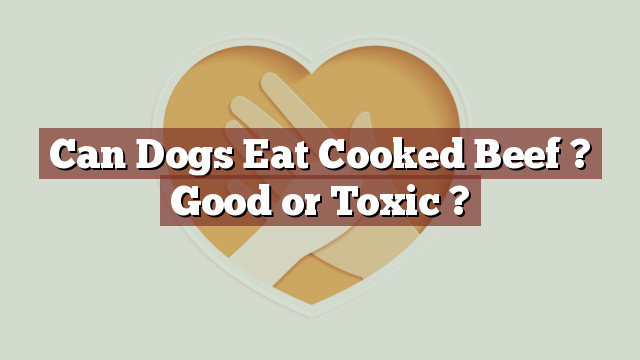Can Dogs Eat Cooked Beef? Good or Toxic?
Knowing what foods are safe for your furry friend is essential for maintaining their health and well-being. Many pet owners often wonder if it is safe to feed their dogs cooked beef. In this article, we will explore the nutritional value of cooked beef for dogs, discuss its safety, potential risks and benefits, and provide guidance on what to do if your dog consumes cooked beef.
Nutritional Value of Cooked Beef for Dogs
Cooked beef is a great source of essential nutrients for dogs. It is rich in high-quality protein, which is crucial for their overall growth and development. Protein helps to build and repair tissues, supports a healthy immune system, and aids in the production of enzymes and hormones. Cooked beef also contains important vitamins and minerals such as B vitamins, iron, zinc, and selenium, which are vital for various bodily functions.
Is Cooked Beef Safe or Toxic for Dogs?
Yes, dogs can safely consume cooked beef. However, there are a few precautions to keep in mind. It is important to ensure that the beef is thoroughly cooked, as undercooked or raw meat can harbor harmful bacteria such as Salmonella or E. coli, which can pose health risks to both dogs and humans. Additionally, certain seasonings or marinades used in cooking beef may contain ingredients that can be toxic to dogs, such as onions or garlic. Therefore, it is crucial to feed your dog plain, unseasoned cooked beef.
Potential Risks and Benefits of Dogs Eating Cooked Beef
When fed in moderation and prepared correctly, cooked beef can provide several benefits to dogs. As mentioned earlier, it is a rich source of protein, which helps to support muscle development and repair. The amino acids found in beef are also essential for maintaining healthy skin and a shiny coat. Furthermore, lean cuts of cooked beef can be part of a balanced diet for dogs, providing them with important vitamins and minerals.
However, there are potential risks associated with feeding cooked beef to dogs. Excessive consumption of beef can lead to weight gain and obesity, which can result in various health issues. It is crucial to ensure that the beef is lean and free from excessive fat, as high-fat content can contribute to pancreatitis in dogs. Additionally, some dogs may have allergies or sensitivities to beef, so it is important to monitor their reactions when introducing it into their diet.
What to Do If Your Dog Eats Cooked Beef
If your dog consumes cooked beef, there is usually no cause for immediate concern. However, if your dog shows signs of gastrointestinal distress such as vomiting, diarrhea, or abdominal pain, it is advisable to consult your veterinarian. They can provide appropriate guidance and treatment if necessary.
Conclusion: Cooked Beef Can Be Safe for Dogs in Moderation
In conclusion, cooked beef can be a safe and nutritious addition to a dog’s diet when fed in moderation and prepared properly. It is important to ensure that the beef is thoroughly cooked and free from any seasoning or ingredients that may be toxic to dogs. Additionally, monitoring your dog’s overall health and any potential reactions to beef is essential. As always, if you have any concerns or questions, it is best to consult with your veterinarian for personalized advice based on your dog’s specific needs.
Thank you for investing your time in exploring [page_title] on Can-Eat.org. Our goal is to provide readers like you with thorough and reliable information about various dietary topics. Each article, including [page_title], stems from diligent research and a passion for understanding the nuances of our food choices. We believe that knowledge is a vital step towards making informed and healthy decisions. However, while "[page_title]" sheds light on its specific topic, it's crucial to remember that everyone's body reacts differently to foods and dietary changes. What might be beneficial for one person could have different effects on another. Before you consider integrating suggestions or insights from "[page_title]" into your diet, it's always wise to consult with a nutritionist or healthcare professional. Their specialized knowledge ensures that you're making choices best suited to your individual health needs. As you navigate [page_title], be mindful of potential allergies, intolerances, or unique dietary requirements you may have. No singular article can capture the vast diversity of human health, and individualized guidance is invaluable. The content provided in [page_title] serves as a general guide. It is not, by any means, a substitute for personalized medical or nutritional advice. Your health should always be the top priority, and professional guidance is the best path forward. In your journey towards a balanced and nutritious lifestyle, we hope that [page_title] serves as a helpful stepping stone. Remember, informed decisions lead to healthier outcomes. Thank you for trusting Can-Eat.org. Continue exploring, learning, and prioritizing your health. Cheers to a well-informed and healthier future!

